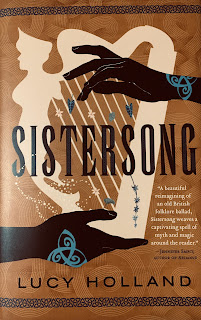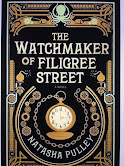Some Books Defy Description by Theresa Gauthier
A review of Sistersong by Lucy Holland
As I start to write this review, I’m really not sure what I’m going to say. I don't feel as though I've figured it out yet. When I started reading Sistersong by Lucy Holland, I had a lot of high expectations, and for the most part, these were met. In other ways I really don’t think I can give a wholehearted recommendation for it.
I’m trying to be positive about this book, because I hate writing negative reviews. In truth, it wasn’t a completely negative experience. I was racing through the book in the beginning—and I was enjoying the story.
It revolves around three sisters, Riva, Keyne, and Sinne.
Riva, horribly burned in an accident when she was a child, has a bad foot and a bad hand. She wants to heal it with her magic, but she never can no matter how hard she tries. We’re led to believe this is because magic is getting weaker.
Her love interest was harder to pin down. Tristan is a stranger who comes to the story in a positive light, but I admit I didn’t trust him. I assumed some things about him and was right, but Riva’s fear of never marrying and ending up being sent to a covent, combined with her surprise that anyone like Tristan could be attracted to her make her vulnerable and unreasonable concerning him.
Tristan’s friend, a large man named Os who had—for some undisclosed reason—had his tongue cut out long before we ever meet him. Both characters seemed to have obvious roles in the tale and both were rather bland.
The second sister was the most well-developed, least derivative character, and certainly the most interesting, yet at the same time, I couldn’t help think she was only a shadow of what she could have been. The other two sisters coming to terms with what they had, on some level, guessed about their middle sister was well done, but their seeming indifference to it was bizarre.
The youngest sister is the least developed of the three. She’s a bit spoiled, a bit full of herself, a bit too sure of her own beauty, and in the end her tendency to fool herself that the silly fantasies in her head could in some way become reality was damaging to her and to her family. I kept expecting her to ‘grow up’ and see things about herself and her oldest sister as clearly as she seemed to come to understand her middle sister.
The girls’ parents are probably the least well-developed in the story. They’re king and queen—they may love each other, but I saw no evidence of that. The queen is foreign and though she accepted the ways and traditions of her husband’s home at first, when we meet her, she’s decided she shouldn’t forget her own traditions. She’s invited a Christian priest to their home and expects everyone to forsake their own religion in favor of hers.
The priest seemed to be there only to be the hated enemy of the natural order of things. Yes, he was horrible, but it seemed that the only reason for him to be part of the story was to be horrible. There was no exploration of him as a character. There was no look into his behavior to determine if he were truly devout or just using his position to leverage power. Did he believe he was favored by God? Did he believe he was there to save them all? Myrdhin, a powerful—in the sense of wielding magic—friend to the kingdom, implies something about the character and if that had been explored it would have given some weight to the story and some dimension to the character. Instead, the priest is vile, evil, untrustworthy, and even self-deluded. Like the rest of the characters he’s one-dimensional.
It was really the denouement that made this story something less to me than it might have been. Until I got to that point, I was at least marginally entertained. Imagine watching a fantasy film like Willow or even The Wizard of Oz and then towards the end, they splice in a new ending by M. Night Shyamalan. That’s the level of disturbing this was. I was reading it with my mouth hanging open in horror and disbelief. It wasn’t just the event that was being described, but also that it rendered the entire tale pointless.
In truth, if it had worked, if this ending had paired well with what had come before, I would have been more accepting of it. I wouldn’t have enjoyed it, but I would have accepted it as integral to the story. What I read wasn’t integral to anything and it seemed out of place.
The most appropriate word—besides unsatisfying—I can think of to describe the ending is ‘disturbing’ but it’s more than that. It’s also frustrating. There was no focus. There were ideas, and suggestions, but they were just ideas. Nothing was analyzed beyond the most rudimentary stages. Was Christianity “bad” for magic users? A book that better examines this would be The Mists of Avalon by Marion Zimmer Bradley.
I feel let down by the book, and I wonder at all the great reviews I’ve read. My advice—if you don’t like violence for violence’s sake, don’t read the book. If you like a book that leaves you disturbed and unsettled (which aren’t necessarily bad things depending on the story and the author’s intent) then this may be the book for you. If not, check out Marion Zimmer Bradley.







Comments
Post a Comment